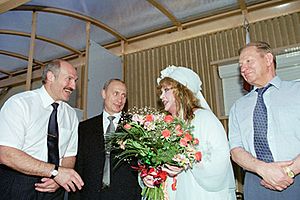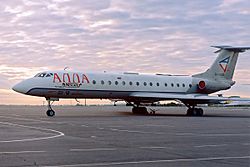Alla Pugacheva facts for kids
Quick facts for kids
Alla Pugacheva
|
|
|---|---|
| Алла Пугачёва | |
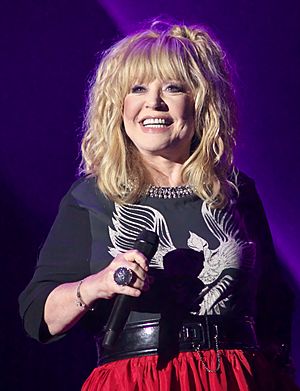
Pugacheva in 2016
|
|
| Born | 15 April 1949 Moscow, Soviet Union
|
| Other names | Boris Gorbonos |
| Citizenship |
|
| Occupation |
|
| Years active | 1965–present |
|
Notable work
|
Discography |
| Spouse(s) |
Mykolas Orbakas
(m. 1969; div. 1973)Alexander Stefanovich
(m. 1976; div. 1980)Yevgeniy Boldin
(m. 1985; div. 1993)Maxim Galkin
(m. 2011) |
| Children | 3, including Kristina Orbakaitė |
| Musical career | |
| Genres | |
| Instruments |
|
| Labels |
|
| Signature | |
 |
|
Alla Borisovna Pugacheva (born 15 April 1949) is a famous Russian singer and songwriter. She started her music career in 1965 and is still active today. She is known for her clear voice and ability to show strong feelings in her songs. Many people in the countries that used to be part of the Soviet Union see her as a music icon. She has sold more records and been more popular than almost any other Soviet performer. People often call her "the Queen of Russian pop music." Alla Pugacheva is one of the few Russian artists who became famous around the world.
She has sung over 500 songs in many languages, including Russian, English, and French. Her music collection includes more than 100 records, CDs, and DVDs. Her albums have been released in countries like Japan, Sweden, Germany, and Israel. In total, she has sold over 250 million records. Her first album, Mirror of the Soul, sold 10 million copies. Other albums, like How Disturbing Is This Way from 1982, also sold millions of copies.
Alla Pugacheva has performed in many countries across Europe, Asia, and even in the United States and the United Kingdom. She has sung in famous places like Carnegie Hall in New York and Olympia in Paris. Her songs "Harlequin" and "A Million Scarlet Roses" became big international hits.
In 1988, Billboard magazine compared her to music legends like Bing Crosby, Elvis Presley, and Michael Jackson. In 2000, The New York Times called her "the goddess of Russian pop music."
She received the title of People's Artist of the USSR in 1991, which is a very high honor for an artist. She has also won many awards in different countries, including the United States and Germany. Forbes magazine included her in their list of "100 most influential Russians of the century" in 2017. In 2022, she was on the BBC's 100 Women list. For many years, she earned the most money among performers in Eastern Europe. Because of her long-lasting popularity, some media outlets have called her the "Russian Madonna."
Besides singing, Alla Pugacheva has acted in movies and musicals. She has also lent her voice to films and recorded songs for movie soundtracks. ..... She was also a UNICEF Goodwill Ambassador from 1998 to 2007.
Contents
Early Life and Music Start
Alla Pugacheva was born in Moscow on April 15, 1949. She started music school when she was just seven years old in 1956. She also went to a music college to study choral conducting.
In 1965, when she was 16, Alla recorded her very first song. It was called "Robot" and played on a radio show. This was the beginning of her long and successful music journey.
Alla Pugacheva's Music Journey
Early Career and First Successes (1965–1976)
After finishing college in 1966, Alla Pugacheva toured with a group called Yunost' (meaning Youth). She also worked as a piano player at a music college. She was the lead singer for several bands, including Moskvichi (Muscovites) and Vesyolye Rebyata (Merry Folks). During this time, she recorded songs for many movies.
In 1975, she won the top prize at the Golden Orpheus singing contest in Bulgaria with her song "Harlequin." This song became a huge hit, selling 14 million copies. The next year, she sang for the musical movie The Irony of Fate, providing the voice for the main female character.
Becoming a Star (1977–1980)
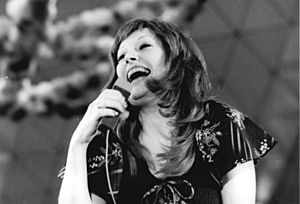
In 1977, Alla Pugacheva starred in the musical film The Woman who Sings. She played a famous singer who gives up her personal life for her career. The movie's soundtrack, which she helped write, was very popular. Over 55 million people watched the film, making it a record-breaker in 1979. The soundtrack was released as her album Mirror of the Soul.
In 1978, she won another award, the Amber Nightingale prize, at the Sopot International Song Festival for her song "Kings Can Do Anything." This award also meant she won the Grand Prix of the Intervision Song Contest. Her music was also released in Japan and Finland. In 1979, she performed a duet with the famous singer Joe Dassin in Moscow.
International Collaborations (1981–1994)
In the 1980s, Alla Pugacheva often visited Stockholm, Sweden. She appeared on popular radio and TV shows there. She even recorded an album in English called Watch Out.
From 1985 to 1988, her music style changed to a more modern sound with rock guitars. She toured many countries, including Finland, Sweden, and the United States. In 1985, a ferry in Finland was even named "Alla" in her honor.
She also worked with German rocker Udo Lindenberg, releasing an album together. In 1987, she sang with American singer Barry Manilow in Vienna. She also performed with Swedish and Norwegian pop groups. In 1986, she bravely performed for the workers who were cleaning up after the Chernobyl disaster. In 1987, she was a main performer at the Sanremo Music Festival alongside Whitney Houston.
Continuing Success and New Ventures (1995–2006)
In 1995, Alla Pugacheva was a main performer at the Voice of Asia music festival. In 1997, she represented Russia in the Eurovision Song Contest.
She also started her own shoe brand called "Alla Pugachova" and a perfume called "Alla." Both were very successful. From 1998 to 2000, she went on a big international tour, performing over 150 concerts in many countries. She also released music videos and won awards for her songs during this time.
In 1999, she performed with the Gay Men's Chorus of Los Angeles in Moscow. By 2000, she had sold a quarter of a billion records. Her albums in 2003 and 2008 received "gold disc" status in Russia. From 2005 to 2019, she gave money prizes to young talented singers from different countries.
Farewell Tour and Later Work (2007–Present)
From 2007 to 2010, Alla Pugacheva was the artistic director of her own radio station, "Radio Alla," in Moscow. She chose the music and hosted her own shows.
From 2009 to 2010, she went on an international concert tour called "Dreams of Love" in 13 countries. After this tour, she announced that she would stop touring. From 2011 to 2013, she was a judge on the Russian version of the TV show The X Factor.
In 2014, a concert was held in Jurmala, Latvia, where other artists sang her hits. Famous singers like Ricky Martin were guests, and Alla Pugacheva herself performed at the end. In 2015, American TV host Jimmy Fallon said he liked her song "Superman."
In 2017, she performed at a music festival in Baku. In 2019, she gave a solo concert in Moscow called "P.S." In 2021, she recorded a song for the film Chernobyl. In May 2022, she took part in the Free Culture Forum in Tel Aviv. In 2024, she visited the Rendezvous music festival in Jurmala as a guest.
Her Voice and Music Style
Experts have praised Alla Pugacheva's wide vocal range, from a deep contralto to a high soprano. Music critics have noted that her songs combine different styles, like folk, reggae, blues, and gypsy music. She often wrote the music for her songs and showed different singing and acting skills.
A French newspaper, France-Soir, gave a positive review of her performance in Paris in 1982. An American music critic, Jon Pareles, described her music as having a "Slavic tone" with changing, dramatic moods, even though it used Western instruments and styles.
Working with Other Artists
Alla Pugacheva has worked with many artists from around the world. These include Jacob Dahlin, Raimonds Pauls, Gloria Gaynor, Demis Roussos, Joe Dassin, Udo Lindenberg, and Barry Manilow. In 2009, she sang a duet with Ukrainian singer Sofia Rotaru.
Film Roles
Besides her music, Alla Pugacheva has acted in several films and musicals. Her most famous roles are in The Woman who Sings (1978) and musicals like “Old Songs about the Main Thing” (1996, 1997, 2000). She also recorded songs for the film Chernobyl in 2021. In 1979, she was named the best actress in Eastern Europe by the magazine “Soviet Screen”.
Alla Pugacheva's Legacy
In 1985, a ferry in Finland was named "Alla" in her honor. In 2009, her name was placed on the Square of Stars at the Slavic Bazaar festival in Vitebsk.
In 2014, designers created 13 dolls that looked like Alla Pugacheva in her different stage outfits. In 2019, an exhibition about her life and career was held at the Boris Yeltsin Presidential Center.
Many famous artists, poets, and musicians have dedicated works to Alla Pugacheva. They see her as a very important artist whose influence is deeply felt in Eastern Europe.
Personal Life
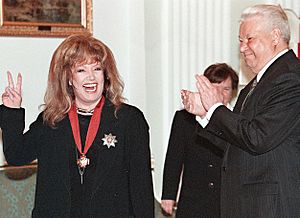
Alla Pugacheva has been married five times. In 1969, she married circus performer Mykolas Orbakas. They had a daughter, Kristina Orbakaitė, who is also a popular singer. They divorced in 1973.
In 1976, she married film director Alexander Stefanovich. They divorced in 1980. In 1985, she married producer Yevgeniy Boldin. They worked together on many projects. She also had a relationship with musician Vladimir Kuzmin during this time. She divorced Boldin in 1993.
In 1994, she married pop singer Philipp Kirkorov. They divorced in 2005. On 23 December 2011, Alla Pugacheva married singer and comedian Maxim Galkin. They have twins who were born through a surrogate mother.
Public Activities
Alla Pugacheva has been involved in public life for many years. In 1996, she supported Boris Yeltsin's presidential campaign. She later said she was paid a lot for her performances during this campaign.
From 1998 to 2007, she was a UNICEF Goodwill Ambassador, helping children around the world. In 2005, she became a member of the Civic Chamber of the Russian Federation, working on social issues.
Since 2011, she has openly supported politician Mikhail Prokhorov. ..... Alla Pugacheva is considered a gay icon in Russia. She was ranked among the "100 Most Influential Women of Russia" in 2012.
Views on the Russo-Ukrainian War
In March 2014, Alla Pugacheva signed a petition against the unfair treatment of Andrey Makarevich, who spoke out against the events in Crimea and Donbas.
In March 2022, Alla Pugacheva and her husband, Maxim Galkin, left Russia for Israel. In September 2022, after her husband was called a "foreign agent" by the Russian government, she publicly spoke out against the war. She asked the Ministry of Justice to also declare her a foreign agent. She said she supported her husband, who is "an honest, decent and sincere person, a true and incorruptible patriot of Russia." She wished for "peaceful life, freedom of speech and an end of the deaths of our men for the illusory goals that make our country an outcast."
Russian authorities began looking into her for "discrediting" the Russian military. In October 2022, she confirmed she had left Russia again for Israel and had received Israeli citizenship. In November 2023, she briefly returned to Russia before leaving for Latvia. As of 2024, Alla Pugacheva lives in Cyprus.
Many artists, including the British pop group Pet Shop Boys, German rock musician Udo Lindenberg, and Ukrainian singer Svetlana Loboda, have supported Alla Pugacheva for her courage.
Awards and Honors
Alla Pugacheva's highest honor is "People's Artist of the USSR," which she received in 1991. This was the top award for a musician in the Soviet Union. She also received earlier titles like "Honored Artist of the RSFSR" in 1980 and "People's Artist of the RSFSR" in 1985.
In 1999, Russian President Boris Yeltsin gave her the Order of Merit for the Fatherland, 2nd class. She also received this order in 3rd and 4th classes in later years. In 1994, she was given the title of Countess by the Russian Assembly of Nobility.
She has won many music awards, including:
- Grand Prix of the Golden Orpheus International Vocal Competition (Bulgaria, 1975)
- Grand Prix "Amber Nightingale" at the International Song Festival "Intervision" (Poland, 1978)
- The Golden Microphone award as the best singer in Europe (Germany, 1981)
- Ampex Golden Reel Award for her album "Watch Out" (USA, 1989)
- Recognized as the best singer of the 20th century in Eastern Europe by the ZD Awards (1999)
- Ovation Award in the category "Best Singer of the Decade" (2001)
- Platinum disc from the Melodiya label for selling millions of records (2009)
- Inducted into the Top Hit Music Awards Hall of Fame (Eastern Europe, 2013)
| Awards | ||
|---|---|---|
| Ovation | ||
| Preceded by ' |
Living Legend Award 1994 Alla Pugacheva |
Succeeded by 1995 Joseph Kobzon |
Alla Pugacheva's Music
Popular Songs
- "Harlequin"
- "The Woman Who Sings"
- "Kings Can Do Anything"
- "Millions of Scarlet Roses"
- "Goodbye, Summer"
- "Shakespeare's Sonnet"
- "Ballet"
- "This World"
- "You Know, It's Still Going to Be"
- "Two Stars"
- "I Kissed You"
- "The Paper Kite"
- "Autumn Kiss"
- "A Song About Myself (Just Like Everyone Else)"
- "The Train Will Go to Tikhoretskaya"
- "100 Friends"
- "Iceberg"
- "The Ferryman"
- "The Half-Educated Wizard"
- "Vintage Watch"
- "Maestro"
- "Gypsy Choir"
- "The White Door"
- "Wow"
- "Find Me"
- "Hello"
- "Superman"
- "Every Night and Every Day"
- "Moscow Rock"
- "Love, Like a Dream"
- "I Won't Give You Up to Anyone"
- "Autumn Leaves"
- "Call Me With You"
- "A Candle Was Burning on the Table"
- "I'll Go Into the Water"
- "Careful Leaf Fall"
- "River Tram"
- "Dove"
- "Madame Broshkina"
- "A Thousand Years"
- "Be It or Not Be It"
- "I'm Singing"
- "Another Snowstorm"
- "They Beat Us, We Fly"
- "I Flew"
Main Albums
| Year | Title in English | Format | Label, Country |
|---|---|---|---|
| 1976 | Golden Orpheus 76 | Live LP | Balkanton, Bulgaria |
| 1977 | The Mirror of the Soul | Double LP | Melodiya, USSR |
| 1979 | Harlequin and Other Songs | LP | |
| 1980 | Be Beyond a Fuss of Life | ||
| 1980 | Something's Still to Come | ||
| 1982 | How Disturbing Is This Way | Double | |
| 1985 | Ah, How I Want to Live | LP | |
| 1985 | Watch Out | Watch Out | World Record Music, Sweden |
| 1986 | ...and Happiness in Private Life | Melodiya, USSR | |
| 1986 | I'm Here Talking to You | ||
| 1990 | Alla | CD | |
| 1991 | Christmas meetings 1990 | 2LP | Russian disc, USSR |
| 1992 | Christmas meetings 1991 | Russian disc, Russia | |
| 1995 | Don't Hurt Me, Gentlemen | CD | Soyuz, Russia |
| 1998 | Yes! | Extraphone, Russia | |
| 2001 | River Tram | Alla, Russia | |
| 2002 | Was There a Boy? | ||
| 2003 | Live Peacefully, My Country! | Alla & Monolit, Russia | |
| 2008 | Invitation to a Sunset | Alla |
Other Albums and Compilations
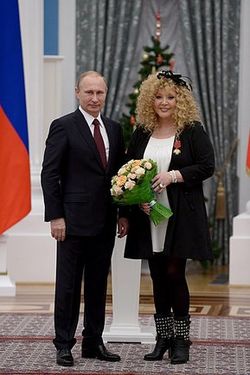
- 1978 Alla Pugacheva (Japan) – collection of songs
- 1979 Alla Pugacheva and Iosif Kobzon – shared album
- 1980 Diskoteka A – instrumental remixes
- 1980 Alla Pugatšova. Huipulla (Finland)
- 1984 Alla Pugacheva – Soviet Superstar. Greatest Hits 1976–84 (Sweden) – collection of songs
- 1988 Songs Instead Of Letters – shared album with Udo Lindenberg
- 1996 A 13 CD collection of her older songs
- 1997 Two Stars (with Vladimir Kuzmin) – shared album
- 1998 Surprise from Alla Pugacheva – tribute album
CD Singles
- 1997 Primadonna (for Eurovision 1997)
- 2000 White Snow
- 2000 Madam Broshkina
- 2002 It's Love
Other Media Appearances
Films and TV Shows
- 1978 The Woman Who Sings (film)
- 1985 I Came and I'm Speaking (film)
- 1989–2002 Christmas Meetings (TV show)
- 2003 Chasing Two Rabbits (film)
Documentaries about Alla Pugacheva
- "At Alla's" (Finland, 1979)
- "How does a Soviet superstar live?" (Sweden, 1983)
- "Rock around the Kremlin" (France, 1985)
Video Games
- 2023 - Atomic Heart, a video game featuring remixes of her songs like "A Starry Summer" and "Million of Scarlet Roses."
See also
 In Spanish: Ala Pugachova para niños
In Spanish: Ala Pugachova para niños
- Russian pop music
- Honorific nicknames in popular music
- Russian emigration during the Russian invasion of Ukraine
 | Selma Burke |
 | Pauline Powell Burns |
 | Frederick J. Brown |
 | Robert Blackburn |


